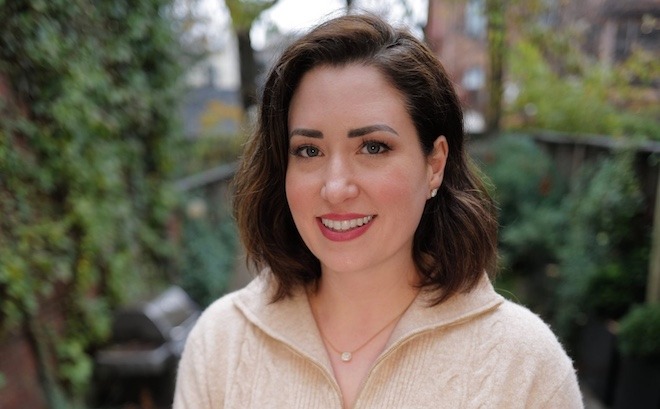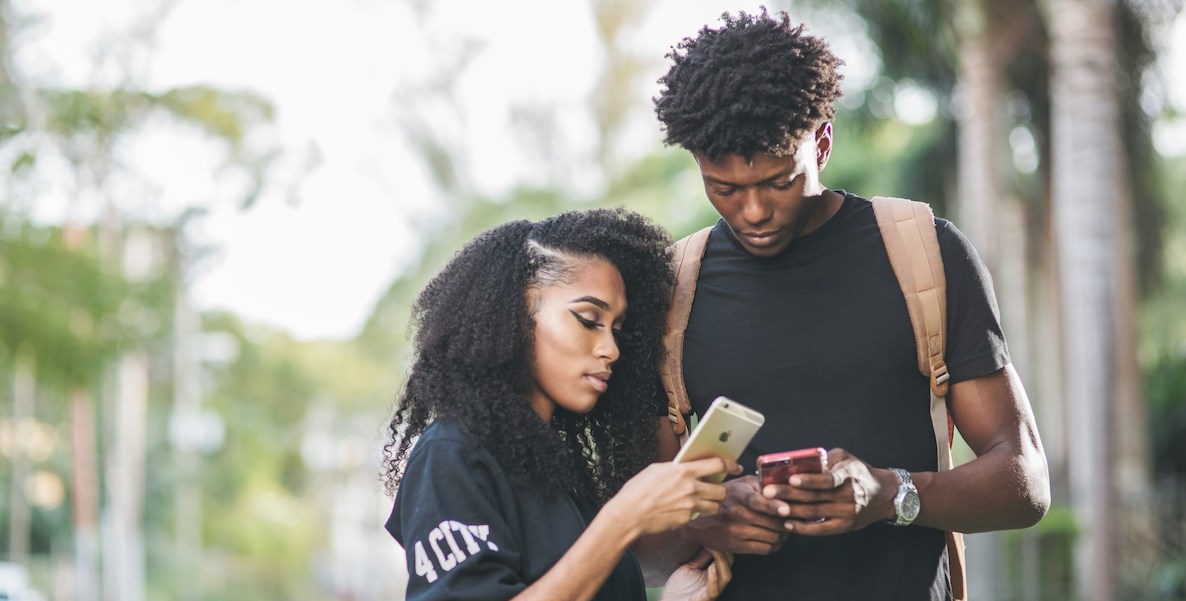When you think of social media influencers, you likely imagine trusted trendsetters with thousands, if not millions, of faithful followers on one or more of the four largest social media platforms.
More than likely, that’s not you. You have three followers on Instagram, have never made a TikTok, watch old sitcoms on YouTube, and stopped posting regularly on Facebook ages ago.
But you do have a phone. And friends. And — get this!— you, too, can be an influencer!
All you need is ripple, a new political project that provides tips and scripts to be shared on social media or in texts to friends. Have a friend who isn’t registered to vote? Ripple will provide the information they need to change that. Your neighbor’s unclear about where to cast her ballot? Ripple can help. Questions about a candidate’s stances on social issues? Ripple has the goods on pols currently seeking national, state and local office.

Ripple “is a way to help people have these conversations that are the most impactful way to influence an election,” says Emily Amick, a political analyst who, as emilyinyourphone, has more than 171,000 Instagram followers. Ripple is a project of For Facts Sake, the nonprofit Amick founded in 2023.
“A majority of young Americans get their news from social media,” says Amick, who previously served as legal counsel to U.S. Senate Majority Leader Chuck Schumer. “This is where people go to for political news and the people they are looking towards are influencers.”
Personal contact can make a difference: In 2020, researchers from Columbia University Data Science Institute concluded that individuals who received texts from friends about voting were 8 percent more likely to go to the polls than those who did not receive such texts.
“If you’re looking for a restaurant, you can look online to get recommendations, but if one of your friends says, I really like this restaurant and I think you’ll like it too, you’re going to go. Because when you have a relationship with someone, you trust their advice,” Amick says. “That’s what ripple is all about.”
The influencers’ influence
Amick didn’t join social media with politics in mind. When she launched her Instagram account in 2019, “I used to post a lot of pictures of my dogs, because they’re adorable and who doesn’t love that,” she says. “Then I started posting my political opinions as well.”
Amick has long been professionally connected to politics. A graduate of Columbia Law School, she was a staff attorney for a New York non-profit that supports victims of domestic violence in addition to her work for Schumer. Still, she was surprised by how quickly she gained Instagram followers and how eager they were to engage. “There wasn’t anyone talking about democratic values, democratic policies on Instagram in a way that made sense … and also gave people the tools to take action,” she says.
“When you have a relationship with someone, you trust their advice.” — Emily Amick
In her New York Times bestseller Democracy in Retrograde, Amick posits that civic engagement is a form of self-care. Worldwide surveys in 2020 and 2021 showed how Covid increased the number of people who reported feeling anxious and depressed.
Taking action, feeling like one’s efforts actually make a difference, was one way to move beyond those negative feelings.
Over time, Amick’s Instagram audience has grown into a community, currently 171,000 strong. And still, they wanted more. In response, Amick launched a Substack, Emily In Your Phone, that currently has 20,000 subscribers.((She’s also a trained journalist with a Master’s degree from the University of Alabama.) She also started a podcast, We’ve Got Issues with fellow political junkie / journalist / author Jo Piazza, a Citizen contributor.
Piazza, who is also working closely with Amick on ripple, says the impact influencers will have on this election “can not be over-exaggerated.”
“These relationships (on social media) are incredibly intimate and can be more impactful than door knocking or letter-writing campaigns because you often feel these people are your friends and they’re in the palm of your hand all of the time,” Piazza says.
How ripple works
Since its launch at the end of August, ripple has, well, rippled, attracting users from across the country. While Amick would not provide exact numbers, the ripple team says the total number of users exploded in the first two weeks of September and has almost doubled since then.
When someone signs on to ripple, they’re asked to list contacts they’d like to reach, including friends, family, college classmates, former romantic interests, current crushes. With a name, age and location, ripple can determine if that contact is registered to vote and, if so, if they’d done so in recent elections.
“Lots of people have been surprised to find their friends haven’t been voting. I think there’s more apathy among our friend groups than we think,” Amick says. “Ripple helps people start conversations they otherwise wouldn’t have started. We’ve heard success stories of people talking to friends who are totally undecided and helping them get the information they need to make up their minds.”
Pennsylvania currently has the fifth highest number of ripple users and the second highest number of listed contacts, which makes sense, as so many people outside the Commonwealth care about its crucial electoral votes.
“Ripple helps people start conversations they otherwise wouldn’t have started.” — Emily Amick
“You hear from people all over the country, I want to do something in Pennsylvania. Should I come there? Should I door knock? No, you can do something from where you are,” Piazza says.. “That’s been very empowering to a lot of people across the country.”
Harnessing the power of social networks to spread a message or promote a product isn’t new. In the 1980s, Fabergé Organics shampoo ads famously urged users to tell two friends about the product because then they would tell two friends “and so on and so on and so on.”
What is new, and ever evolving, is how people get their information. With a fast forward option and a mute button, it’s unlikely those Fabergé Organics shampoo commercials would have the same impact today.
At issue, however, is the amount of disinformation being peddled on social media. Ripple is “fact-based, or as fact-based as we can possibly make it: ‘This person is running for this seat and this is their record,’” Piazza says. “We’re trying to combat all the misinformation that is out there. Wading through the quagmire of both social media and the internet just to find who is in your local races is very hard these days. A lot of people get disheartened and burnt out from the very beginning.”
Ripple is a way to engage this so-called “exhausted majority.” A 2023 Pew Research Center study found that 65 percent of respondents reported feeling always or often exhausted when thinking about politics. More than half of respondents said thinking about politics made them feel angry. (Other signs of the times: about 10 percent said they always or often feel hopeful about politics. Only 4 percent said they were excited.)
“We hear all the time, Who are these undecided voters? … The reasons people are undecided may completely surprise you, and I think it’s because there’s so much distrust out there of mainstream media, and social media is making things so confusing because of misinformation and a lot of blatant lies out there,” Piazza says.
“I’m surrounded by people who have voted in the past, who are very well-educated, who are intensely burnt out by politics, and they have checked out. They want hope again and they want fact-based information. Ripple has helped me get people excited about these races again.”
Another issue, Amick says, is the misperception that a single vote doesn’t matter. Making your voice heard and fighting for what you believe in with a goal of making your community better can satisfy the soul. To rally the disheartened, Amick suggests stressing the big impact seemingly small races can have.
“When you talk about the local races, you realize how much impact you can have with a statehouse election or by voting for a Congressman,” she says. “Every Senate race across the country is going to be the deciding factor in what the Senate does moving forward. There’s so much on the line. We need to have these conversations and pull people back in.”
 Every Voice, Every Vote funds Philadelphia media and community organizations to expand access to civic news and information. The coalition is led by The Lenfest Institute for Journalism. Lead support for Every Voice, Every Vote in 2024 and 2025 is provided by the William Penn Foundation with additional funding from The Lenfest Institute for Journalism, Comcast NBC Universal, The John S. and James L. Knight Foundation, Henry L. Kimelman Family Foundation, Judy and Peter Leone, Arctos Foundation, Wyncote Foundation, 25th Century Foundation, and Dolfinger-McMahon Foundation.
Every Voice, Every Vote funds Philadelphia media and community organizations to expand access to civic news and information. The coalition is led by The Lenfest Institute for Journalism. Lead support for Every Voice, Every Vote in 2024 and 2025 is provided by the William Penn Foundation with additional funding from The Lenfest Institute for Journalism, Comcast NBC Universal, The John S. and James L. Knight Foundation, Henry L. Kimelman Family Foundation, Judy and Peter Leone, Arctos Foundation, Wyncote Foundation, 25th Century Foundation, and Dolfinger-McMahon Foundation.
![]()
MORE ON THE 2024 ELECTION IN PHILADELPHIA
Photo by Shawn Fields for Unsplash.


